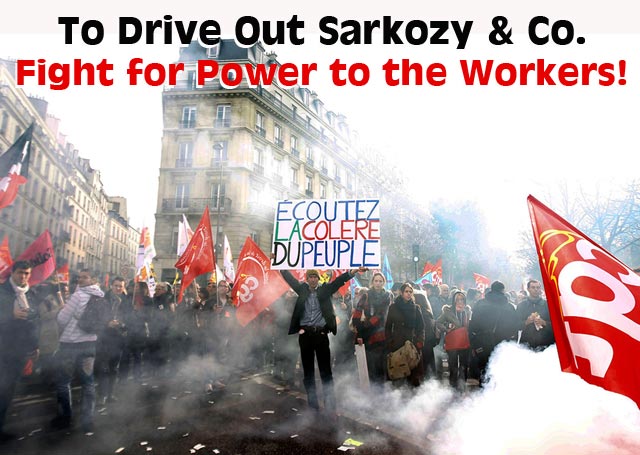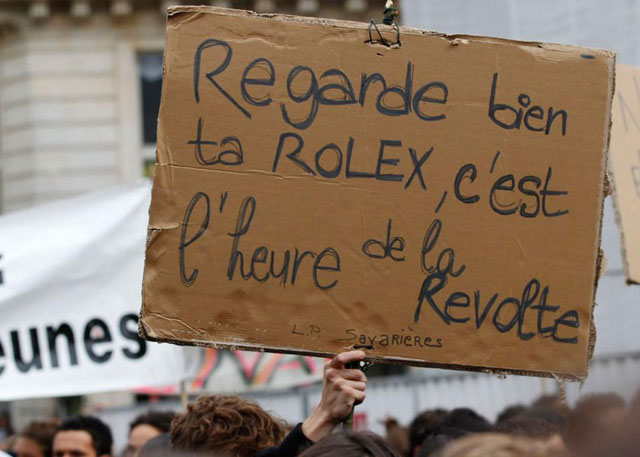
October 2010

Union demonstration outside the French Senate, Paris, October 20. What is needed is to bring to bear
the power of the workers in a general strike to block the economy and defeat Sarkozy's anti-working-
class offensive. (Photo: Claude Platiau/Reuters)
Build a Workers Party on the Revolutionary Program of Lenin and Trotsky
PARIS, October 26 – In the last week, the battle lines in the conflict over the conservative government’s pension “reform” law have hardened. On Tuesday, October 19, once again some 3.5 million people responded to the call of unions, striking and demonstrating in cities around France in the sixth “day of action” in the last seven weeks. In some places, such as Toulouse, the marches were the largest yet. Meanwhile, the two-week-old strike of French refineries and the blockade of fuel depots are beginning to bite. Despite government imports of 100,000 tons of fuel a day, a third of France’s 12,000 service stations have run out of fuel. And while the number of passenger trains has been cut in half by strikes on the SNCF, the national railways, rail transport of freight has been slashed by 90 percent while go-slow actions by the truckers unions have tied up major highways. As a result, a number of key industries are running out of supplies. Yet public support for the strikes and protests is still overwhelming.
The response of the President Nicolas Sarkozy has been to crack the whip. On government orders, the Senate shut off debate on the pension “reform” just as opposition Communist and Socialist parties were presenting amendments. Its passage on Friday evening [October 22] was pre-ordained, given Sarkozy’s presidential majority in both houses. The final law, combining Senate and National Assembly versions, may be voted as early as today, . While ramming the bill through parliament, the government ordered the CRS riot police to dissolve strikers’ blockades around the fuel depots. At the Grandpuits oil refinery about 100 km. outside Paris, the departmental prefect (an agent of the national government) requisitioned strikers to get the fuel supplies moving. On Friday morning, riot cops attacked the pickets, injuring three strikers. When a judge ruled this military measure illegal, for violating the constitutional right to strike, the prefect simply issued a second requisition order. Yet while fuel stocks are drawn down, no additional amounts are being produced by the struck refinery.
This
has been the first time since the 1968 general strike that all of
France’s
refineries have stopped production. Moreover, oil imports at the
Mediterranean
ports of Marseille and Fos-sur-Mer have been halted since dock workers
there
went on strike at the end of September over the government’s
privatization
plans which threaten their jobs. (Simultaneously, Marseille garbage
workers struck
for the last two weeks.) Car owners consult Internet sites desperately
looking
for stations that still have fuel. Yet despite the inconvenience,
public
support is strong: a survey on Saturday, October 23 showed fully 69
percent in
favor of the strikes and protests even after the Senate passed the law.
French
working people understand that the pension “reform” is a frontal attack
on
their living standard and indeed way of life. A big majority have come
to
despise Sarkozy for his high-handed measures, his cavalier treatment of
parliamentary opposition, his brutal repression, his catering to the
rich and contempt
for the common people. One of the most expressive photos of last week
was a
sign in a demonstration of high school students, “Stop with the
Contempt.”
Another read: “Take a Good Look at Your Rolex, It’s the Hour of Revolt!”

“Take a Good Look at Your Rolex, It’s the
Hour of Revolt!” Sign at demonstration in Lyon, October 19.
(Photo: Stéphane Mahe/Reuters)
Millions have had it with Sarkozy, and this raz-le-bol (roughly, being fed up) is a major factor fueling the protests. Last summer, there was a huge scandal because his labor minister, Eric Woerth, had proposed Liliane Bettencourt, heiress of the L’Oréal fortune and the second richest person in France, for the Legion of Honor just when she was revealed (on a tape recorded by her butler!) talking with her financial advisors about how to avoid $100 million in taxes by sending money to Swiss banks, and making illegal payments to key politicians, notably in Sarkozy’s party, the UMP. One of Bettencourt’s main financial advisors was none other than Woerth’s wife, while the labor minister himself was treasurer of the UMP and organizer of his quarterly meals with rich supporters at the three-star Hotel Bristol. Yet this didn’t stop the president from having Woerth present and defend the pension law to parliament. Everyone could see that Sarkozy was catering to the rich while stealing workers’ retirement.
According to Saturday’s poll, 70 percent of the French public is dissatisfied with Sarkozy’s performance, the highest figure for rejection of any president since General Charles De Gaulle founded the Fifth Republic in 1958. The Journal du Dimanche (25 October) published the survey under the headline, “An Anti-Sarkozy Movement.” But this doesn’t faze him. The French president fancies himself like De Gaulle as a “savior” of the bourgeois nation against the forces of disorder and dissolution, and presents the battle over pensions as the opening of his campaign for reelection in 2012. He wants to be known as having the “courage” to enact an unpopular law, that is, thwarting the democratic will of the majority. Sarkozy’s bonapartist appetites are notorious, and in many ways he imitates the style of Berlusconi in Italy – although, so far, without the neo-fascist squads and Lega Nord thugs. Those he intends to pick up by grabbing the electoral base of Jean-Marie Le Pen’s fascist National Front, which is a major reason behind his “security” offensive and racist repression against the Roms, and immigrants generally.
Many bourgeois commentators have asked incredulously why high school students take to the streets and youth of immigrant origin from the working-class suburbs invade the elegant city centers to protest a law about pensions, and why the mobilizations keep up even though they have almost no chance of success in the usual terms of parliamentary politics. Sarkozy has made it clear he will not back down no matter what, and with his “presidential majority” he has the means to ensure that. This arrogance is a good part of the reason why Sarkozy has earned the kind of massive and deep hatred among French working people and particularly the youth that U.S. president George W. Bush had in the last years of his presidency. But while this has swollen the ranks of demonstrators, and helps explain why weeks of mobilizations and strikes have not diminished popular support for the protests, it also has the potential to undercut the very real possibility of winning a genuine victory. Why? Because rather than bring strike battle to a head, the reformists (including the so-called “far left”) are looking to electoral politics.
The Socialist Party (PS) in particular wants to channel the protests into the 2012 elections. Its leaders march in, and even at the head of the mobilizations, but don’t want them to “go too far.” And they waffle on the substance of Sarkozy’s attack on workers’ pension rights: they are for a “reform,” just not his. PS first secretary Martine Aubry last January at first accepted the proposal to raise the retirement age to 62, then backed down ten days later, promising to restore the right to retire at 60 if Sarkozy took it away. Now she has once again put this pledge in question. A leading contender for the Socialist presidential nomination is International Monetary Fund head Dominique Strauss Kahn, whose IMF earlier this month issued a report backing the French government’s pension “reform” – for which minister Woerth effusively thanked him. Strauss-Kahn is an actual bourgeois figure in this social-democratic bourgeois workers party that has followed Tony Blair’s “New Labour” in abandoning its support for the “welfare state” and increasingly distancing itself from the labor movement. Bottom line: if the PS returns to office in 2012, French workers will have to work longer to get the right to retire, just as under Sarkozy.
There is a long history in France of reformist misleaders holding back struggles, and then some time later claiming victory when they get a turn in office managing the affairs of the bourgeoisie for a few years. The 1968 general strike was sold out, but De Gaulle ended up resigning (handing the presidency over to his prime minister Georges Pompidou). When in 1981 Mitterrand finally became president, this was hailed as a belated victory for the ’68ers. But the popular-front coalition led by the refounded Socialist Party in conjunction with minor bourgeois parties like the Left Radicals fully supported NATO in its imperialist drive against the Soviet Union and carried out dirigiste (capitalist state planning) economic policies similar to those of its conservative predecessors. After the 1995 mobilizations only partially stopped Prime Minister Alain Juppé’s pension “reform” plan, the election of Socialist Leonel Jospin as president two years later was again hailed by the reformists. Yet Jospin’s policies were just as “neo-liberal” as those of his conservative predecessors and successors, and under the Socialist-led bourgeois coalition government France fully supported NATO’s 1999 war on Yugoslavia.
Sabotaging struggles in the factories and on the streets so that they are defeated and then channeling the discontent into the swamp of parliamentary politics is a main purpose of popular fronts, which organizationally chain the workers movement, along with other movements of the oppressed, to sections of the bourgeoisie. In 1968, the French Communist Party wanted to call off the general strike in order to build support for a popular front on a “common program,” with Mitterrand as its potential leader. In Mexico today, the struggles of the electrical workers and miners against union-busting attacks by the government of Felipe Calderón have been limited to petitioning Congress and begging the Supreme Court, and are now subordinated to the 2012 election campaign of a popular front around Andrés Manuel López Obrador. In a different context in the United States, leftist organizers tied protests against the invasion of Iraq to the Democratic Party via a popular-front antiwar “movement,” feeding into the election of Barack Obama, who then continued the U.S. occupation of Iraq and escalated the war on Afghanistan.
The current struggle in France presents tremendous possibilities for a revolutionary break with bourgeois politics and trade-union reformism, which is a dead-end in this epoch of capitalist decay where genuine reforms in the interest of the working people are no longer possible and past gains are being systematically ripped up. What’s needed is a revolutionary leadership to defeat the politics of class collaboration and lead the way forward on the road of class struggle. This not only means breaking with the Socialists, but also with the Communist Party (PCF) which has been pushing the Left Front as the core of a new popular front. The most prominent presidential hopeful for this front is Jean-Luc Mélenchon, the head of the Left Party (PG), which split from the Socialists after the last election. Mélenchon’s politics borrow liberally from the rhetoric of Latin American nationalist populists like Hugo Chávez in Venezuela and Ecuador’s Rafael Correa, taking over the latter’s slogan for a “citizens’ revolution.” In terms of French politics, he describes himself as “a child of the Common Program” of Mitterrand’s NATO popular front (see Libération, 20 October).1
Mélechon’s Left Party has largely eclipsed the so-called “far left” formations, the New Anti-Capitalist Party (NPA) and Lutte Ouvrière (L.O.), whose 2006 presidential vote scores were a flash in the pan and have since dwindled to a little over 1 percent. While occasionally saying that a general strike would be nice, the thrust of the NPA’s position in the present struggle is to simply keep on mobilizing. Thus the 14 October issue of the NPA’s paper Tout Est À Nous argued that “it is necessary to prolong the mobilization with extendable strikes where possible but also by all forms of capable of bringing together the largest number [of people].” (No general strike in that issue.) The 21 October issue of TEAN headlines, “Victory Is Possible!” gushing:
“In a few days the climate has changed. It’s a turning point! You can sense everywhere that it could tip over, that the mobilization could carry it off, that there is a chance to be seized upon: that it is possible to win....
“It is a social and political crisis, a deep-going movement demanding the resignation of Sarkozy, [Prime Minister François] Fillon and the other Woerths! They should give in or get out!”
Meanwhile, according to today’s DirectMatin,
NPA
spokesman
Olivier
Besancenot, “who has had to …
put a damper on his call for ‘a new May ’68,’ has proposed a summit
meeting of
the left parties,” an open door for a new popular front. But this also
has gone
nowhere.

“Down with the Contempt.” Sign in a
demonstration by high school students in Paris, October 21.
(Photo: AFP)
From a battle to stop an attack on workers’ rights, these “anti-capitalists” are now posing it as a “movement” calling for resignation of the government. To be replaced by what? Another capitalist government. The NPA’s sometime talk of an “extendable general strike” and a “new May ’68” is just that – talk to keep any radicals and would-be revolutionaries in its ranks content. When the former LCR abandoned its last pretenses to “communism” and “revolution” by dissolving and reinventing itself as the NPA; when it ditched references to the dictatorship of the proletariat in favor of (bourgeois) “democracy,” when NPA spokesman Besancenot says he is anything but an admirer of Lenin and Trotsky, at least they are being consistent with their actual program of “reforming” capitalism. But seeking to reform the unreformable – a system based on exploitation of workers, racist repression and imperialist war – is a ticket for defeat.
It’s clear that Sarkozy, Fillon, Woerth & Co. are not about to give in or get out. Nor can the present mobilizations do the job: endless marches, even if they are extended (a seventh “day of action” is scheduled for this Thursday, October 28, and an eighth for November 6), will eventually run out of steam. With his command of the machinery and tremendous resources of the capitalist state, the hardline rightist president will either try to wait them out or to crush them. Yes, it is possible to bring down a bourgeois regime, especially one as widely hated as this one, but this can only done by driving it out through sharp class struggle leading to a fight for a workers government. Simply replacing one bourgeois government with another anti-working-class regime, even if it is decked out in “left” clothing, is no victory.
A real general strike requires solid preparation for a confrontation with the capitalist state. To be successful, even at the level of a defensive struggle, it must become a proletarian counteroffensive, raising transitional demands – from a shorter workweek with no loss in pay to workers control – that are not vaguely “anti-capitalist” but incompatible with capitalism, posing a struggle for socialist revolution. Breaking with reformism and popular-frontism to begin the arduous task of forging the nucleus Trotskyist vanguard party of the working class to lead that struggle is the key task in France today. ■
1 Mitterrand, the model for both the “leftist” Mélenchon and the rightist Socialist Strauss-Kahn, was the French Socialist president in the 1980s and early ’90s, who in an earlier incarnation was a perennial bourgeois minister during the Fourth Republic, notoriously in charge of the interior ministry (i.e., police repression) at the outbreak of the Algerian war for independence. This supposed socialist started out his political career as an official in the Nazi-collaborationist regime of Marshal Philippe Pétain during World War II.
To contact the Internationalist Group and the League for the Fourth International, send e-mail to: internationalistgroup@msn.com